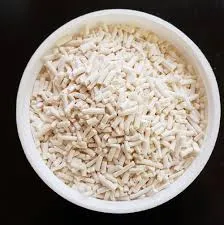
Exploring the Benefits of Malic Acid as a Natural Preservative in Food Products
The Role of Malic Acid as a Preservative in Food Industry
Malic acid, a naturally occurring organic acid found in various fruits, notably apples, plays a vital role in the food industry, particularly as a preservative. Its presence can be traced back to its usage in culinary practices and food preservation techniques that date back centuries. Today, malic acid’s significance has been amplified due to the growing demand for natural and safer food preservation methods. This article delves into the properties of malic acid, its applications as a preservative, and its benefits compared to traditional preservatives.
Chemical Properties and Functionality
Malic acid, with the chemical formula C4H6O5, is a dicarboxylic acid that consists of two carboxyl groups. It is well-noted for its tart flavor and is commonly used to enhance the taste of food items by adding acidity. Beyond its flavor-enhancing qualities, the acid has functional benefits that are crucial for food preservation. Its ability to adjust the pH level of food products creates an unfavorable environment for the growth of spoilage microorganisms, including bacteria and fungi.
Applications in the Food Industry
In the realm of food preservation, malic acid is utilized across various products, including beverages, canned goods, sauces, and confectionery. For instance, in the beverage industry, malic acid is often added to soft drinks and fruit juices to provide a tart flavor while improving shelf life. Its acidic nature aids in maintaining the freshness of these products by inhibiting microbial growth and oxidation, which are common causes of spoilage.
Moreover, malic acid is frequently used in the preparation of jams and jellies. The low pH it imparts not only prevents yeast growth but also enhances the natural flavors of the fruits used. In processed foods such as canned vegetables and meats, malic acid acts as a stabilizer, ensuring the items remain safe for consumption over extended periods.
malic acid preservative

Advantages Over Traditional Preservatives
The shift toward natural food preservation methods has highlighted malic acid's advantages compared to synthetic preservatives like sodium benzoate and potassium sorbate. Consumers are increasingly wary of chemicals in their food, leading to a preference for ingredients derived from natural sources. Malic acid, being a naturally occurring component of several fruits, aligns with the clean label movement that emphasizes transparency in food ingredients.
Additionally, malic acid poses minimal health risks. Unlike some chemical preservatives, which have been linked to allergies and various health concerns, malic acid is generally recognized as safe (GRAS) by food safety authorities, including the U.S. Food and Drug Administration (FDA). This reputation enhances its value as a preservative in health-conscious markets, where consumers often choose products that promote natural ingredients.
Nutritional Benefits
Beyond its role as a preservative, malic acid also contributes to the nutritional profile of food products. It is involved in the Krebs cycle, a fundamental energy-producing process in our bodies, aiding in the metabolism of carbohydrates and proteins. Furthermore, malic acid has been studied for its potential health benefits, including alleviating symptoms of fibromyalgia and enhancing exercise performance. These additional benefits make malic acid not only a practical choice for food preservation but also an ingredient that can contribute positively to consumers’ health.
Conclusion
As the food industry continues to evolve, malic acid stands out as a versatile and effective preservative. Its natural origins, functional properties, and health benefits position it as an ideal alternative to traditional synthetic preservatives. The growing consumer emphasis on clean, safe, and natural food ingredients further fuels interest in malic acid’s applications. As food manufacturers respond to these demands, it is likely that malic acid will become even more prominent in our diets, ensuring that our food remains not only safe and long-lasting but also deliciously vibrant. Through the thoughtful application of malic acid, we can look forward to a future where food preservation and health go hand in hand.
-
Pure Sodium Dichloroisocyanurate Dihydrate | Powerful DisinfectantNewsAug.29,2025
-
Industrial Chemicals: Quality & Purity for Every IndustryNewsAug.28,2025
-
Nitrile Rubber Honoring Strict Production StandardsNewsAug.22,2025
-
Aspartame Ingredients Honoring Food Safety ValuesNewsAug.22,2025
-
Fertilizer for Balanced Plant NutritionNewsAug.22,2025
-
Cyanide Gold Processing with High Purity AdditivesNewsAug.22,2025
-
Formic Acid in Textile Dyeing ApplicationsNewsAug.22,2025
Hebei Tenger Chemical Technology Co., Ltd. focuses on the chemical industry and is committed to the export service of chemical raw materials.
-

view more DiethanolisopropanolamineIn the ever-growing field of chemical solutions, diethanolisopropanolamine (DEIPA) stands out as a versatile and important compound. Due to its unique chemical structure and properties, DEIPA is of interest to various industries including construction, personal care, and agriculture. -

view more TriisopropanolamineTriisopropanolamine (TIPA) alkanol amine substance, is a kind of alcohol amine compound with amino and alcohol hydroxyl, and because of its molecules contains both amino and hydroxyl. -

view more Tetramethyl Thiuram DisulfideTetramethyl thiuram disulfide, also known as TMTD, is a white to light-yellow powder with a distinct sulfur-like odor. It is soluble in organic solvents such as benzene, acetone, and ethyl acetate, making it highly versatile for use in different formulations. TMTD is known for its excellent vulcanization acceleration properties, which makes it a key ingredient in the production of rubber products. Additionally, it acts as an effective fungicide and bactericide, making it valuable in agricultural applications. Its high purity and stability ensure consistent performance, making it a preferred choice for manufacturers across various industries.





